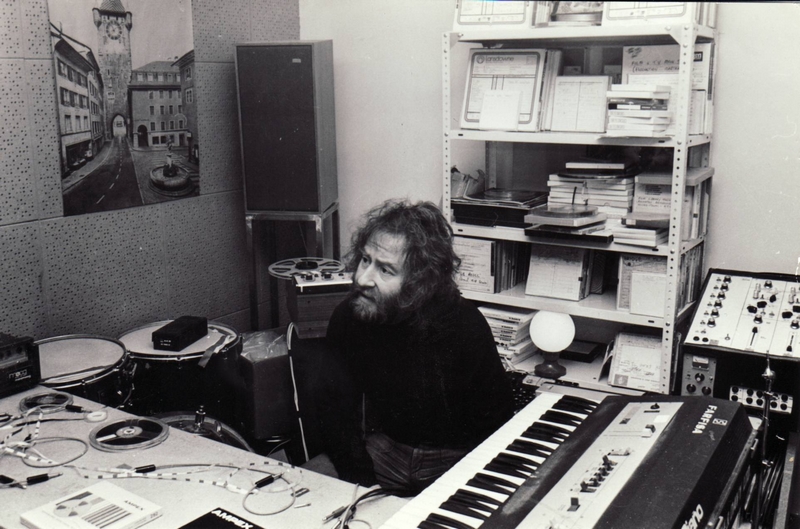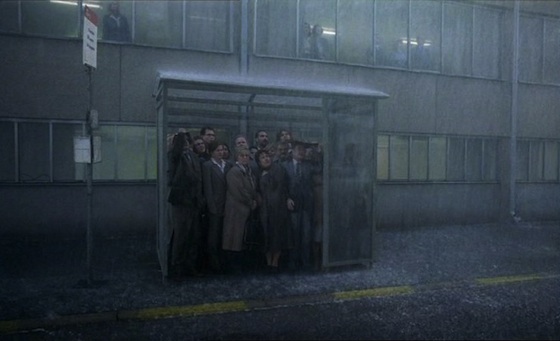Roaring Abstraction – An Introduction To Basil Kirchin

By Jim Slade
Impossible to categorize or pigeonhole, Basil Kirchin (1927-2005), the elusive polymath of Britain’s musical history, left a rich legacy of melodic titbits that branches out across genre and context. Motivated by the recently released ”Basil Kirchin Is My Friend” record and following a spate of concerts, radio programmes and articles, there is new found attention garnering on this British composer. Who is this bushy bearded fellow who throughout a lifelong musical career played drums in the country’s busiest touring Big Band of the postwar era before morphing into the composer du jour of the best cult film soundtracks of the 1960’s? Balancing commercial success with experimental work, he seamlessly blended tape loops with the frenzied playing of free jazz too and yet, as his back catalogue would attest, Basil Kirchin has a sonic signature that is utterly unique.
Basil Kirchin died in 2005 and has since been championed tirelessly by Johnny Trunk of Trunk Records. Trunk, somewhat the king of quirk on the UK label scene, has released several releases of Kirchin’s work over the years, including the much lauded ”Quantum” and ”Abstractions of the Industrial North”, along with film scores such as ”Primitive London” and ”Dr Phibes”. This body of work has gradually built a solid following, warranting a festival celebrating Kirchin earlier this year attracting collaborators such as Goldfrapp/Moog Ensemble head whip Will Gregory. Brian Eno was heavily quoted in an article for The Guardian earlier this year, where he cast praise and not-undue accolades upon Kirchin as an unsung pioneer of ambient music.
This latest record to be released by Trunk Records, a sampler as such and tribute to Kirchin’s vast spectrum of music, is a brilliantly inclusive insight into this composer. ”Basil Kirchin Is My Friend” explores previously released work and newly found recordings alike. Opening with snippets of conversation between Trunk and Kirchin in his kitchen, it alludes to a much more personal relationship between the two men than the standard dynamic between a label boss and an artist.
Kirchin’s discography contains a number of records that are worth digging into. ”Primitive London” (1965) is the original soundtrack from the feature length documentary of the same name, a detailed insight into the social fabric of the metropolis. Strangely melancholic melodies coupled with sleazy imagery of women practising a striptease routine are strangely at odds with each other and Kirchin’s music portrays an underlying sadness to a superficially cheery film. Something to note perhaps, is that the melody from ”Primitive London” shares the same tones and phrasing as that of the theme from ”Taxi Driver”, which was released seven years later…
”Quantum” (2003) is without doubt the most exciting, challenging and downright remarkable piece in Kirchin’s body of work. It stands out because of its compositional approach, its recording techniques and the ideas which it puts forward. It was made in the beginning of the 1970’s – at the same time as the two albums called ”Worlds Within Worlds” – and it introduces a new musical language and the concept of sound within sound. The piece blends tape recordings of birds and insects with the free improvisations of Britain’s most celebrated musicians, Evan Parker, Kenny Wheeler, Graham Lyons and Darryl Runswick. This is combined with the vocal recordings of Kirchin’s wife, Esther, and those of Swiss autistic children living in the village of Schurmatt along with the sounds of a Zurich tram slowed down to reveal incredible harmonics. The combination of these elements is striking, emotionally wrenching and truly brilliant and for the fact it was recorded in 1971, I would add that it offers truly groundbreaking listening for those interested in the development of ambient music.
Trunk Records released this piece in 2003 as an original release, and its inclusion on ”Basil Kirchin Is My Friend” adds weight and depth and gives an insight into this brilliant composer’s mind. The liner notes of this release make for fascinating reading too.
Jumping to the very other end of the sonic spectrum we have the newly discovered “Silicone Chip” rounding off the musical offerings of the Kirchin sampler. A nugget of perfect electro funk celebrating the dawn of a new age, it was recorded in 1979 and is a massively uplifting, toe-tapping little number. It is a small banger in its own right, but after the weighty experiments of ”Quantum” and other such pieces it also highlights his writing dexterity.
This brilliant compilation of musical gems that Trunk Records has put together showcases and highlights an innovative and eccentric composer whose work straddles incredible sonic and genre-spanning breadth. Basil Kirchin’s musical output shines a light wherever he contributes his sonic touch, a light onto counter-cultures and unsung people, and does so in a way not to be derogatory. His music explores the communication we have with nature and our surroundings in a sensitive and inquisitive manner. Johnny Trunk is less convinced of this theory and says Kirchin was a fidget both mentally and physically and smoked a lot of grass.
Where we seem to agree, however, is that the composer lived in a closed world, both personally and musically, and his music reflects this in its uniqueness and timelessness. You should probably listen to some of it.
Info: ”Basil Kirchin Is My Friend” was released this year via Trunk Records. The label states on its website that more Kirchin releases are on their way.



